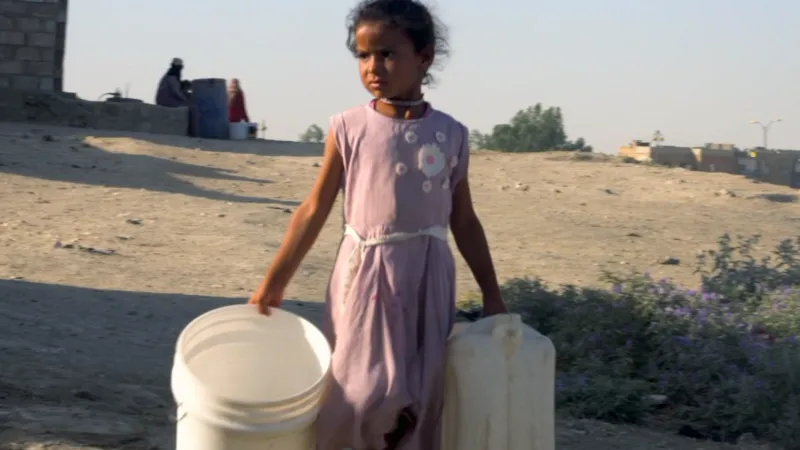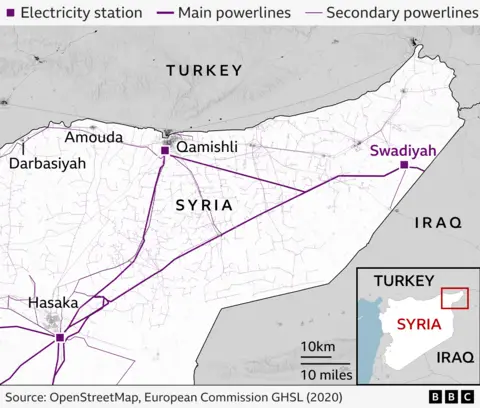

Turkish air strikes in drought-struck north-east Syria have cut off access to electricity and water for more than a million people, in what experts say may be a violation of international law.
Turkey carried out more than 100 attacks between October 2019 and January 2024 on oil fields, gas facilities and power stations in the Kurdish-held Autonomous Administration of North and East Syria (AANES), according to data collated by the BBC World Service.
The attacks have added to the humanitarian crisis in a region reeling from a years-long civil war and four years of extreme drought exacerbated by climate change.
Water had already been scarce, but attacks on electricity infrastructure in October last year shut off power to the region’s main water station, in Alouk, and it has not been working since. On two visits there, the BBC witnessed people struggling to get water.
Turkey said it had targeted the “sources of income and capabilities” of Kurdish separatist groups it regards as terrorists.
It said that it was well known there was a drought in the area, adding that poor water management and neglected infrastructure had made things worse.
The AANES has previously accused Turkey of seeking to “destroy our people’s existence”.
More than a million people in the Hassakeh province who once got their water from Alouk now rely on deliveries of water pumped from around 12 miles (20km) away.
Hundreds of deliveries are made by tanker each day, with the water board prioritising schools, orphanages, hospitals, and those most in need.
But the deliveries are not enough for everyone.
In Hassakeh city, the BBC saw people waiting for the tankers, pleading for the drivers to give them water. “Water is more precious than gold here,” said Ahmad al-Ahmed, a tanker driver. “People need more water. All they want is for you to give them water.”
Some people admitted they fought over it and one woman threatened: “If he [the tanker driver] doesn’t give me water, I’ll puncture his tyres.”
“Let me tell you frankly, north-east Syria is facing a humanitarian catastrophe,” said Yayha Ahmed, co-director of the city water board.

People living in the region have been caught up not only in Syria’s ongoing civil war but also in Turkey’s conflict with Kurdish-led forces, who established the AANES in 2018 after they - with support from the US-led coalition - drove the Islamic State (IS) group out of the region. Coalition forces are still stationed there to prevent a resurgence of IS.
Turkey’s President, Recep Tayyip Erdogan, has described the AANES - which is not officially recognised by the international community - as a “terror state” next to its border.
The Turkish government considers the Kurdish militia that dominates the main military force there to be an extension of the Kurdistan Workers’ Party (PKK) rebel group, which has fought for Kurdish autonomy in Turkey for decades.
The PKK is designated as a terrorist organisation by Turkey, the EU, the UK and the US.
Between October 2023 and January 2024, electricity transfer stations in three areas of the AANES were struck: Amouda, Qamishli, and Darbasiyah, as well as the region’s main power plant, Swadiyah.
The BBC confirmed the damage by using satellite imagery, eyewitness videos, news reports, and visits to the sites.
Satellite imagery of night-time lights from before and after the January 2024 attacks indicated a widespread power outage. “On January 18th.... a significant power outage is evident in the region,” said Ranjay Shrestha, a scientist at Nasa who reviewed the imagery.
After drought and conflict left more than a million people without access to water in north east Syria, this film follows the engineers and tanker drivers trying to get water to those needing it most.











